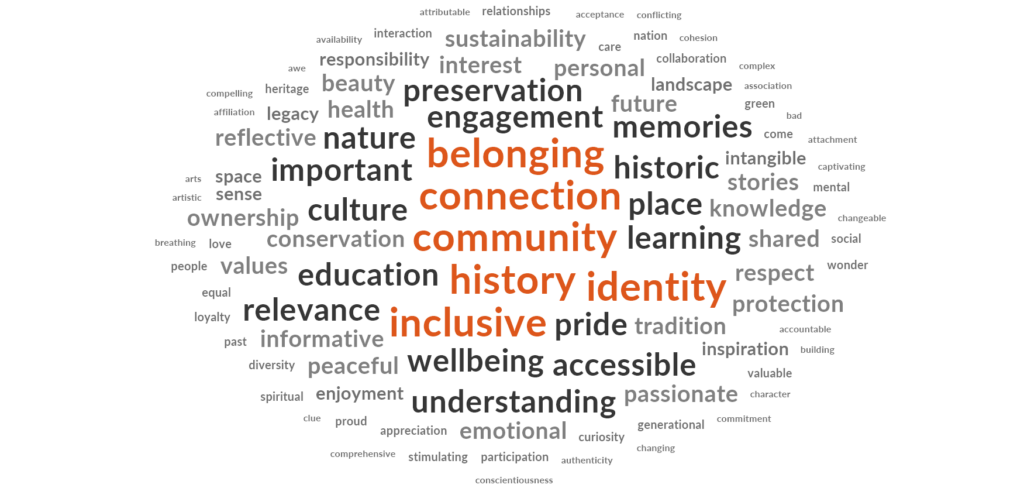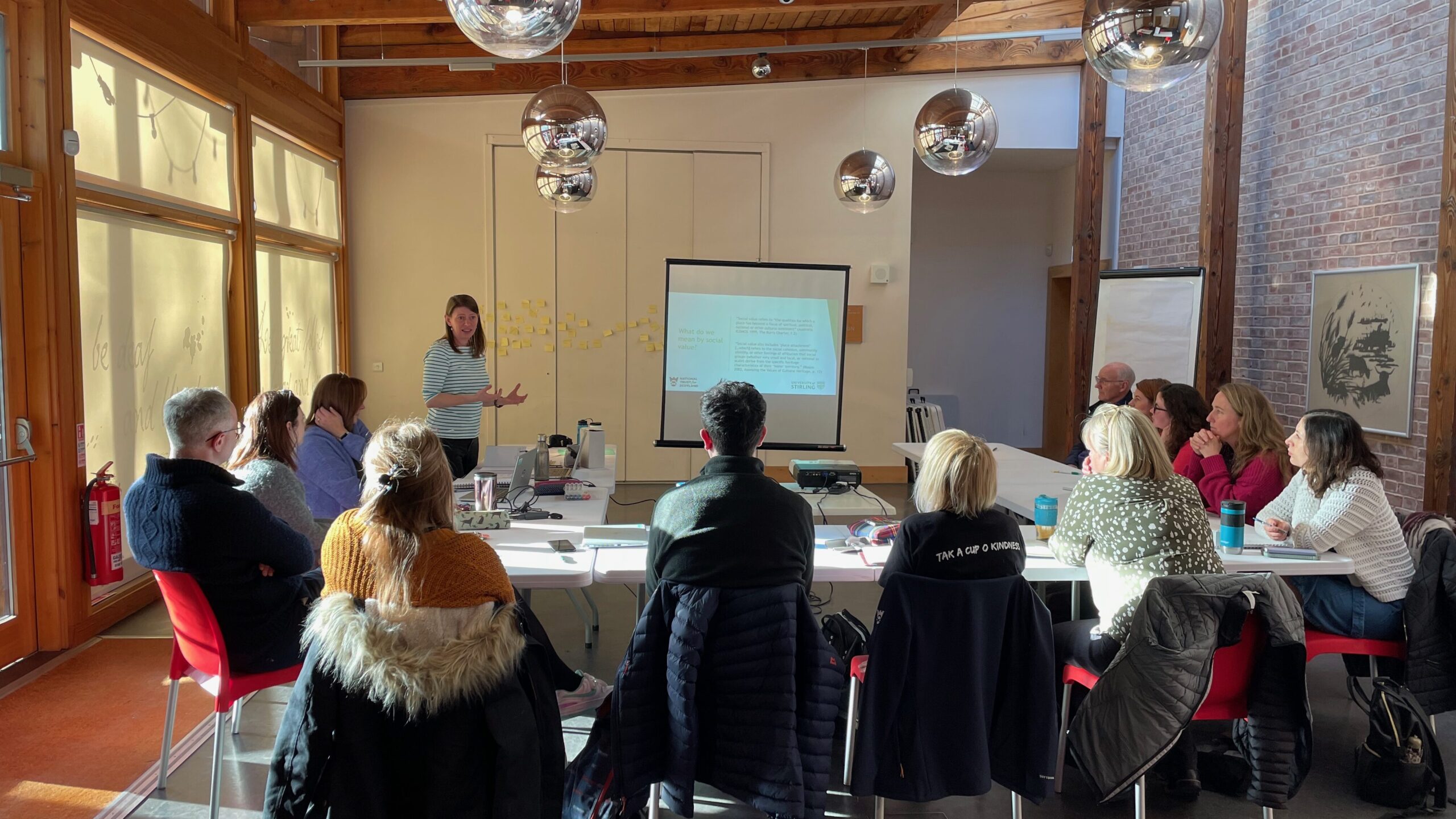By Elizabeth Robson and Siân Jones
Phase One of the project was an organisational overview, exploring current understandings and approaches to social values within the Trust. We also asked staff what they see as the opportunities and challenges of working with social values, and what they would like to see this project deliver. This post summarises our initial results and reflections.
Research activities began in November 2023, with an online survey with qualitative questions open to all Trust staff and volunteers, which received 105 responses from across a wide spectrum of roles. We then held three focus groups with Trust staff and volunteers drawn from across the organisation (36 participants in total) to examine these questions in more depth. We arranged one-to-one interviews with a smaller number of Trust staff, which are on-going and will continue alongside the pilot case studies. Finally, we attended relevant team meetings and events organised by the Trust.
Staff responses to social value: Both survey and focus group participants were asked to identify keywords that they associate with social values (see wordcloud below of the survey responses). Identity, community, place, connection and belonging were among the words mentioned most frequently. These suggest understandings of social value which align quite closely with the project’s working definition.

Wordcloud generated from responses Question 1 of the survey: Please write down 5 descriptive words that come to mind when you think about the social values of heritage. Word size and prominence relates to how frequently the word appeared in the responses.
Memories, stories, inter-generational connections were mentioned directly and implied in words like tradition, legacy/lasting/longevity, while mindfulness, wellbeing and relaxation are reflections on the personal benefits that can be derived from heritage places. History, culture, nature, preservation, conservation, engagement and education were also prominent, terms which connect with long-standing organisational priorities and are perhaps more associated with established forms of expertise.
Less prominent, but noteworthy for us, are the connections staff made between social values and the intangible, emotive aspects of heritage (e.g. beauty, passion, enjoyment, inspiration and pride), as well as trans-generational relationships, sustainability and the future. The connection between social values and the future sustainability of the Trust’s work came through particularly strongly in the focus groups.
Interest and opportunities: In keeping with this future focus, there was a generally positive view among respondents that a knowledge of social values will support staff to deliver the Trust’s organisational mandate, strengthen internal working and external engagement with diverse groups, and deliver a range of other benefits, from sustainability and inclusion to job satisfaction. There is a desire to be at the forefront of this discussion (organisationally and internationally). We have seen great levels of engagement so far and enthusiasm about the coming stages of the project. The interest and excitement for developing new research, testing current processes, and bringing new approaches into practice is reflected in comments such as:
- “It’s looking through a new lens”
- “Engaging in new ways – ‘storypods’ at properties to capture memories, ceilidhs (story-telling gatherings) so people are bouncing off each other – then doing new things with what has been shared”
- Understanding social values could make “a huge difference” to decision-making (e.g. acquisitions and disposal)
- “During Covid, people were exploring their local areas – that feeling is still there of wanting to enjoy, to reconnect, we can fulfil that need”
- “It’s about moving forward, otherwise it won’t be sustainable. We have the history, but the future needs to be informed by the social values”
People-centredness is at the core of the new national Strategy for Scotland’s Historic Environment and the Trust’s ten-year heritage strategy. The incorporation of social values supports the Trust’s mission and, for many staff, is already at the heart of what they do. Lots of roles have public-facing components and knowledge of social values is present in the organisation (with staff and volunteers often also being members of local communities). There are also examples where future planning is being done with communities and other organisations, e.g. creating a shared masterplan for the island of Canna. Social media engagement, properties operating as community hubs, and the diverse memories, stories, oral histories, and community traditions that people share with staff, were all identified as opportunities or ways of connecting current work with social values.
That said, it is widely recognised that ‘social value’ is not a terminology that has been in common use within the Trust. In any large organisation, involving different kinds of expertise, skills and roles, there are difficulties in finding common frames of reference and shared terminology. This is not just a practical issue, but also means having a shared conceptual basis for talking about these types of value and knowledge.

Liz leading one of the focus group discussions. Photo credit: Siân Jones.
Challenges: Potentially more challenging aspects identified by staff include recognising and responding to change (material or values-based), divisions (political or social), previously marginalised or unheard voices, and past or on-going conflicts. Another concern for some is how to ensure an evidence-based approach underpins difficult decisions that might arise from social values assessments. Participants also emphasised the importance of ensuring flexible, responsive, locally-grounded implementation of any organisation-wide approach.
Finally, in discussing challenges, many staff also raised the pressure on time and resources. Despite their enthusiasm, participants highlighted that it will be difficult for them to incorporate work relating to social values if targets, appraisals, and financial priorities/allocations do not recognise relationship development and other qualitative, longer-term, and non-financial returns on investment.
In response to these findings, we will be looking to embed organisational learning throughout the project. Through the pilot studies (see previous post), which are commencing this summer, we aim to understand the social values associated with the properties and how colleagues from across the organisation work with the resulting knowledge and relationships. We will also be working with a Reference Group of staff, drawn from across different roles and organisational remits, to ground the research and its outcomes in the day-to-day realities for different teams, properties, and staff members. In this way, we aim to show how place-sensitive, people-centred approaches can be used to identify replicable lessons that can be adopted into institution-wide frameworks.
Acknowledgements and thanks: We would like to thank everyone who participated in the Phase One research. Your insights and contributions are really appreciated and have helped inform how we progress in this project. This post is drawn from a co-authored paper delivered by Liz Robson and Siân Jones at the 7th Biennial Conference of the Association of Critical Heritage Studies in Ireland, 3-6 June 2024.